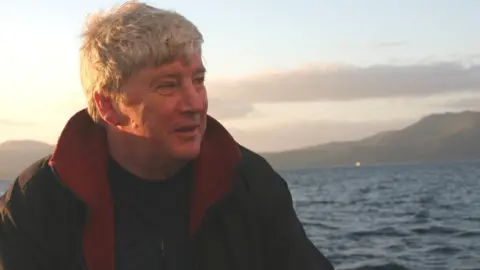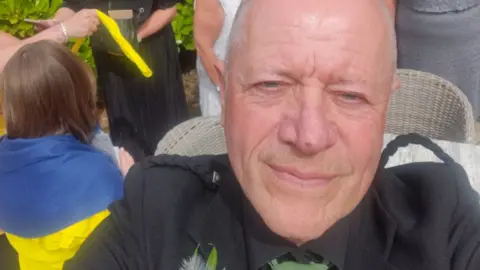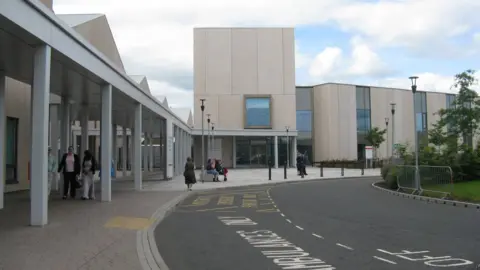Dumfries and Galloway cancer treatment travel review call
 Gordon Baird
Gordon BairdA call has been made for a widespread review of cancer care in Dumfries and Galloway to try to reduce lengthy trips for treatment.
The BBC has been approached by people angered and upset at the distances they or their relatives have had to travel.
Patients in Stranraer can face a 135-mile road trip, one way, to Edinburgh for radiotherapy and scans.
NHS Dumfries and Galloway said staffing and equipment issues made offering some services locally "unlikely".
The arrangement for patients to be treated in Edinburgh is a longstanding one between the health board and NHS Lothian.
However, one former GP, Dr Gordon Baird, set up a petition last year on behalf of the Galloway Community Hospital Action Group.
It called for the creation of an agency dedicated to rural health matters headed by a rural health commissioner.
He said that while he accepted patients might have to travel to get the best possible specialist care but he believed that should be to the nearest centre - which would be Glasgow for those in the west of the region.
It is about 50 miles closer to Stranraer than Edinburgh.
"A lot of people in powerful positions have ignored the reality that we are in the west of Scotland and as a result many patients have suffered unnecessarily," he said.
The director for the Centre for Rural Health at Aberdeen University, Prof Philip Wilson, has joined the call for a "root and branch" review of services in the region.
"A humane NHS would seek to minimise time spent travelling for treatment and deliver as much as possible at community-based hospitals," he said.
"When that's not possible treatment should be at the nearest centre."
The BBC has been contacted by patients and relatives who told us the travelling had added to their distress.
 Terry Craig
Terry CraigTerry Craig, from Dalbeattie, whose wife Olivia died last month from cancer, said her journey to Edinburgh was an ordeal.
"My wife couldn't stand up but the instructions were to go by car for radiotherapy and dose her up with painkillers," he said.
"The pain was atrocious, every half hour I was giving her painkillers to try and make her comfortable on an often bumpy road.
"We left early in the morning and didn't get home until seven o'clock at night."
John Thompson is a campaigner, also from Dalbeattie, who has lost two wives to cancer.
He said he did not understand why radiotherapy and scans could not be provided at Dumfries.
"The fear of death is what hits first, then you have to try and keep up morale but then you get told you have to travel hundreds of miles for a basic scan," he said.
"It's an appalling way to treat people."
'Waste of time'
Edwin Kattenhorn, from Dalbeattie, was treated for prostate cancer, and said one day he was sent from Dumfries to Carlisle and then on to Whitehaven.
On another occasion he spent a week in overnight accommodation for 12 minutes of treatment.
He said it seemed "a waste of time and effort on everybody's part".
All of them praised the treatment received but called for changes to how the system operated and felt they had been "fobbed off" by politicians over the years.
 MJ Richardson
MJ RichardsonNHS Dumfries and Galloway issued a statement in reply to the concerns raised.
It said radiotherapy services were unlikely to be provided by a board of its size.
It said that was not only due to the equipment needed but also the very specialist staffing required.
The health board added that any redesign of treatment pathways would require working in partnership with the Scottish Regional Cancer Networks and other boards, making it a lengthy process.
It added that all work on realignment of cancer services had been paused due to the pandemic.
However, it said free travel was available to patients and stressed that urgent cancer care had continued throughout Covid restrictions.
The Scottish government said the complexity and expense of some cancer treatments meant it was impossible to deliver them in every area.
A spokesperson said: "Where travel is necessary, we expect local Health Boards to make suitable arrangements to ensure that the necessary treatment can be provided in a patient-centred way.
"For those cancer patients wishing to travel to Glasgow instead of Edinburgh, NHS Dumfries & Galloway will support them to use the Glasgow pathway.
"Over the longer term, the [health] board will continue to work to align their services with the West of Scotland Cancer Network."
